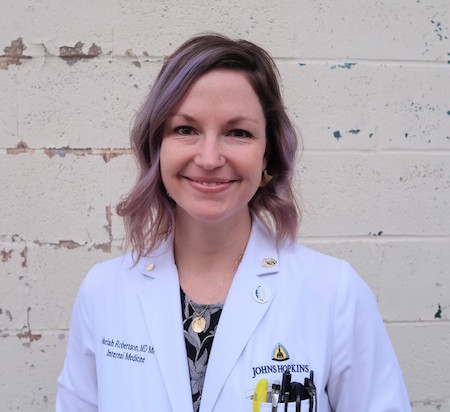Takeaway
Part of my history-taking in the future will include a music history to better understand the role music plays in my patient’s day-to-day lives. I am hopeful that this added information about them will strengthen our connection and understanding of one another as humans.

Lifelong learning in clinical excellence | June 25, 2019 | 3 min read
By Mariah Robertson, MD, Johns Hopkins Medicine
Last year an article came out in a UK-based online website which was quickly circulated on all of the music news outlets and social media touting that going to a live concert every two weeks could result in nearly a decade of increased life expectancy. They attributed this gain in years to increased self-esteem, contentment, happiness, and productivity, among other things. The data that is the basis for the article is quite hard to get access to, and the research itself seems to have been at least in part funded by The 02 , a large music company in the UK, which poses a clear conflict of interest.
Our own fun experiment
All of that said, the article did not surprise music lovers like my husband Dan and me. We decided to embark upon an experiment of our own, an N=2, because we love music and it felt like a fun adventure. Over the past 15 months we have attended at least once concert every two weeks, and at times a concert weekly. We wanted to see if we felt subjectively that our mental health and overall well-being improved as a result
Some of the rules we placed on this adventure were:
1.) We chose concerts that fell later in the evening so it didn’t impact nightly routines with our boys.
2.) We left the concert at a reasonable hour when it fell on a week night so we could get sleep for work.
3.) We left worries at the door no matter how stressful our day was, which meant fewer concerts while on call.
Our results
What we found is that we grew as individuals, as a couple, and as a family. Perhaps it is the fact that we are making deliberate time with one another at regular intervals despite having small children at home, something we weren’t so deliberate about before. Perhaps it is the music itself, which we certainly feel has healing properties for us. Perhaps it is the shared experience with other music lovers who are coming together from all walks of life to listen and sway and enjoy the art.
I suspect it is a combination of all of these things. We have decided to continue the effort of seeing live music as frequently as our schedules and finances will allow. More importantly, we are making the effort to infuse music into our day-to-day at home and work – an easier and less expensive option which has a stronger evidence-base. Our boys (ages 4 and 2), love the dance parties that ensue in the kitchen and living room at home.
The experiment has snuck its way into our workplaces as well. It seems the internal medicine residents enjoy that I am playing music in clinic and before morning report. My husband’s OR team enjoys the music selection he thoughtfully crafts for them when he is scrubbed in for cases.
Lessons learned
I think the secret is that music is something that, when used thoughtfully, brings people together. It can calm you, it can excite you, it can move you. As a future geriatrician and daughter of someone who died with dementia, I am becoming increasingly intrigued by the impact that music can have on cognition.
Part of my history-taking in the future will include a music history to better understand the role music plays in my patient’s day-to-day lives. I am hopeful that this added information about them will strengthen our connection and understanding of one another as humans.
I love these words from piece titled “Connection,” by artist Brian Andreas, who captures the shared experience of live music in a beautiful and poignant way:
there came a moment in the
middle of the song when we
suddenly felt every heartbeat
in the room
& after that we never
forgot we were part of
something much bigger

